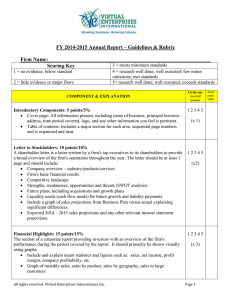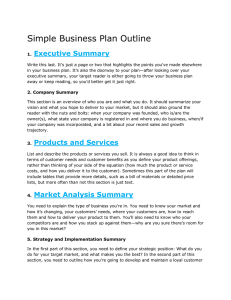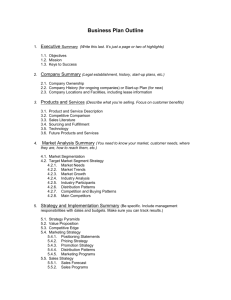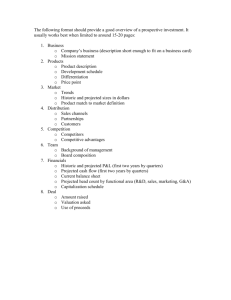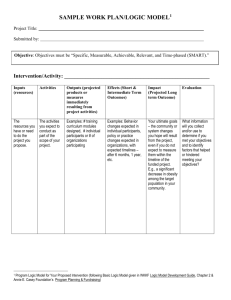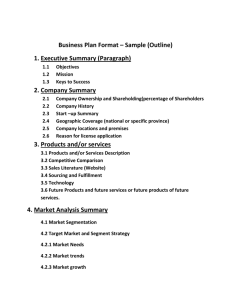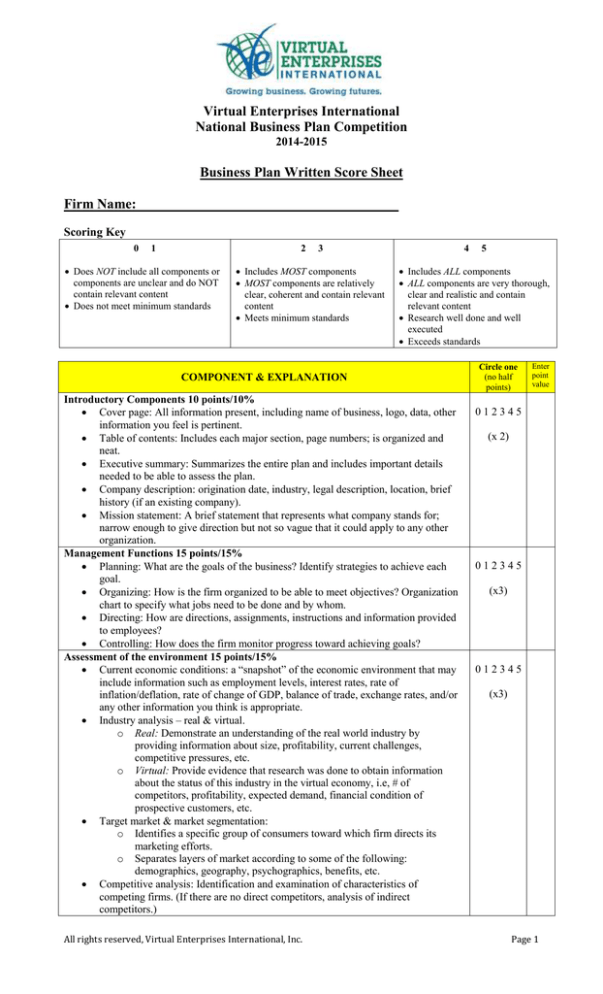
Virtual Enterprises International
National Business Plan Competition
2014-2015
Business Plan Written Score Sheet
Firm Name:______________________________________
Scoring Key
0
1
2
Does NOT include all components or
components are unclear and do NOT
contain relevant content
Does not meet minimum standards
3
Includes MOST components
MOST components are relatively
clear, coherent and contain relevant
content
Meets minimum standards
4
Includes ALL components
ALL components are very thorough,
clear and realistic and contain
relevant content
Research well done and well
executed
Exceeds standards
COMPONENT & EXPLANATION
Introductory Components 10 points/10%
Cover page: All information present, including name of business, logo, data, other
information you feel is pertinent.
Table of contents: Includes each major section, page numbers; is organized and
neat.
Executive summary: Summarizes the entire plan and includes important details
needed to be able to assess the plan.
Company description: origination date, industry, legal description, location, brief
history (if an existing company).
Mission statement: A brief statement that represents what company stands for;
narrow enough to give direction but not so vague that it could apply to any other
organization.
Management Functions 15 points/15%
Planning: What are the goals of the business? Identify strategies to achieve each
goal.
Organizing: How is the firm organized to be able to meet objectives? Organization
chart to specify what jobs need to be done and by whom.
Directing: How are directions, assignments, instructions and information provided
to employees?
Controlling: How does the firm monitor progress toward achieving goals?
Assessment of the environment 15 points/15%
Current economic conditions: a “snapshot” of the economic environment that may
include information such as employment levels, interest rates, rate of
inflation/deflation, rate of change of GDP, balance of trade, exchange rates, and/or
any other information you think is appropriate.
Industry analysis – real & virtual.
o Real: Demonstrate an understanding of the real world industry by
providing information about size, profitability, current challenges,
competitive pressures, etc.
o Virtual: Provide evidence that research was done to obtain information
about the status of this industry in the virtual economy, i.e, # of
competitors, profitability, expected demand, financial condition of
prospective customers, etc.
Target market & market segmentation:
o Identifies a specific group of consumers toward which firm directs its
marketing efforts.
o Separates layers of market according to some of the following:
demographics, geography, psychographics, benefits, etc.
Competitive analysis: Identification and examination of characteristics of
competing firms. (If there are no direct competitors, analysis of indirect
competitors.)
All rights reserved, Virtual Enterprises International, Inc.
5
Circle one
(no half
points)
Enter
point
value
012345
(x 2)
012345
(x3)
012345
(x3)
Page 1
The Marketing Mix 10 points/10%
Product: The product (or key products) including product features that will satisfy
customer needs.
Price: What are the pricing objectives? (Maximize profits? Maximize sales?) How
were prices determined? (Demand-based? Cost-based? Competition-based?)
Placement: What percentage of sales is from trade shows? What percentage is Webbased? What percentage is from non-virtual customers?
Promotion: How do customers know about your business and the benefits of doing
business with you?
Positioning: The image created in the customer’s mind.
Break-even Analysis 5 points/5%
Provide break-even amounts in total dollars or number of sales. Provide details
about assumptions you used to perform analysis including the profit margin
percentage. (Assume that all costs are fixed except for cost of goods sold.)
Financial Data 25 points/25%
Income Statement:
o Projected: Provide a projected multiple-step income statement for the fiscal
year ending 4/30/2015with details by month. Breakout sales made at trade
shows and to non-virtual entities. (Contract sales to non-virtual entities
may not exceed 75% of budgeted salaries expense for the current fiscal
year.) Note: Some months of this statement will include actual numbers.
Label columns as “actual” or “projected.”
o Actual: Provide an income statement through December 31, 2014with
actual numbers.
Balance Sheet:
o Projected: Provide a projected balance sheet dated 4/30/2015.
o Actual: Provide a balance sheet using actual numbers as of 12/31/14.
Cash Budget:
o Projected: Provide a projected cash budget for payments and receipts of
cash for the fiscal year ending 4/30/2015 with details by month. Note:
Some months of this statement will include actual numbers. Label columns
as “actual” or “projected.”
o Actual: Provide a cash budget through December 31, 2014 with actual
numbers.
Notes to financial statements that explain or provide additional details about the
assumptions and/or methods used to determine the numbers.
Financial Write-up:
o A written summary/explanation/interpretation of the financial data. Include
a comparison of projected and actual numbers through 12/31/14 with an
explanation for significant differences.
o Financial Statement Reporting Form with actual numbers*
o Local competitions: income statement & cash budget through 10/31/14;
balance sheet 10/31/2014.
o National competition: income statement & cash budget through 12/31/14;
balance sheet 12/31/2014.
*Actual numbers subject to independent verification and business plan
disqualification
SWOT Analysis & Discussion of Business Risks 10 points/10%
SWOT analysis - 5 points
o Distinguish between internal and external analysis.
Discussion of business risks - 5 points
o Identify the risks that will occur if assumptions you have made are
incorrect.
o Provide a strategy for dealing with the risks identified.
Presentation of Plan 10 points/10%
Logical organization, well designed, free of errors, writing quality, effective use of
charts, graphs and graphics.
Includes an appendix that includes
o copy of bank statement
o copy of contract used for sales of non-virtual entities
o loan amortization table
o notes or citations to research
All rights reserved, Virtual Enterprises International, Inc.
012345
(x 2)
012345
(x 1)
012345
(x 5)
012345
(x 1)
012345
(x 1)
012345
(x 2)
Page 2
NOTE 1:
Plans will be disqualified if missing any of the following from the Appendix –
Copy of bank statement showing balances of all accounts as of 10/31/14 (local competition) or
12/31/2014 (national competition).
Copy of contract used for sales to non-virtual entities with required contact information (if applicable).
Loan amortization table for loan or proposed loan (for firms with loan payable or with applications for
loan pending).
Notes or citations to research.
NOTE 2:
Document Format/Requirements
Business plans cannot exceed 20 pages
Cover page, table of contents, executive summary, appendix and 5 additional pages of supporting documents will
not count towards the 20 page limit.
Written plans must be presented in 12 point font and be one-and-one-half or double spaced.
All required financials must be included within the 20-page limit.
Judge’s name (please print) ____________________________
Judge’s signature
____________________________
All rights reserved, Virtual Enterprises International, Inc.
Page 3

